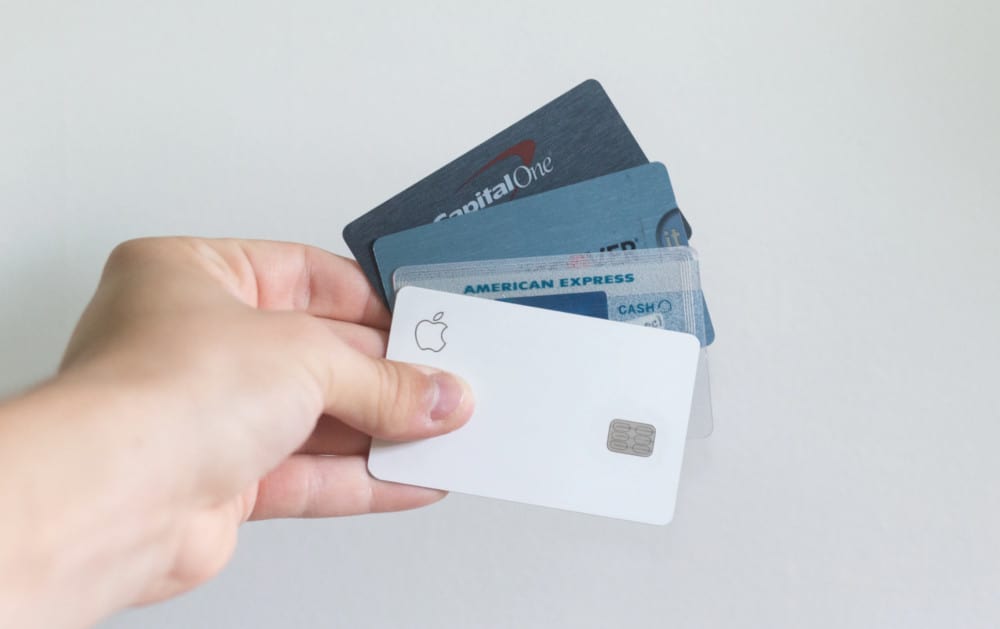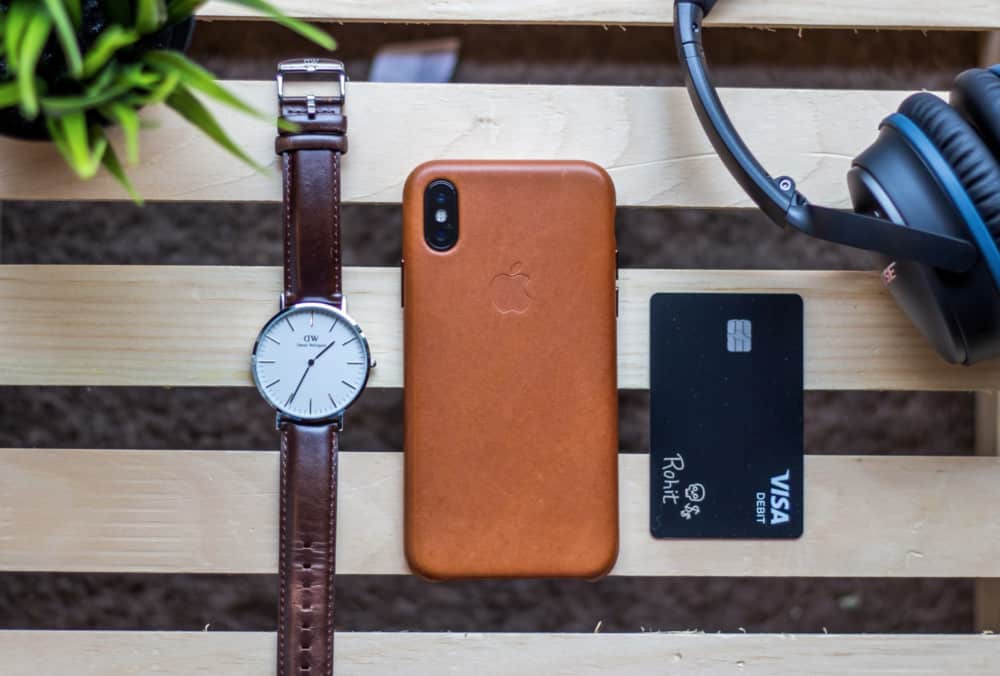Buying a phone outright requires cash up front, and if you don’t have that, and you don’t want a contract plan, your only other option is a credit card. In this guide, we’ll detail the PROS and CONS of buying a phone with a credit card…
Let’s Start With The CONS: Or, Why You Shouldn’t Buy A Phone With A Credit Card…
If you’re in the market for a new phone, and you want to buy outright, the easiest (but also the most dangerous) way to do this is via a credit card.
Why dangerous?
It’s not dangerous per se, but you can get yourself into a lot of financial mess with a credit card if you cannot keep up with the monthly payments.
You will pay interest on your credit card too, so whatever you spend on the card, you’ll have to pay back with interest – this is how credit companies make money.
They’re not in it for your benefit; it’s all about the interest – if you borrow £100, you pay back £110. That’s an ELI5 version of how a credit card works, but the concept is simple: with credit cards you ALWAYS pay back more than you borrow.
This is why it is called credit.
If you’re fiscally responsible and are versed in balancing your accounts, you don’t live out of your overdraft, and you have a stable, predictable income, a credit card can be very beneficial.
All credit card transactions are protected against theft, so, if your account was compromised, you’d be covered. This is why millions of people ONLY use credit cards when shopping online. It’s safer than using a debit card (which is where your real money lives).
A credit card will also help you pay for goods today with money that you don’t yet have. As long as you can pay back the borrowed amount, you’re all good. Where things go wrong with credit cards is when you start using them like debit cards.
This is when bad things happen. Things like massive monthly fees, huge amounts of charges, and an ever-growing balance that you need to pay back but can’t because you can only afford to pay the minimum monthly payments.
This is when compound interest starts working against you; the less you pay back, the more the interest grows, adding additional sums of money to your account’s balance that has to be paid back. This is what is known as a vicious debt cycle – it just keeps on going and going until you take out the balance.
This has happened to me before; it wasn’t fun – it took me years to get out of the hole (and I only had an outstanding balance of £2000).
For this reason, if you’re relatively young and you’re thinking about buying a phone using a credit card, I would recommend you do not do it – it simply isn’t worth it.
If you’re under 25, or a student, you want to stay as far away from liabilities as you can. And a credit card with a £1000 charge on it for a new iPhone is one hell of a liability to have hanging over your head.
How Much Does It Cost To Buy iPhone on Credit?
Taking the example of a £1000 iPhone, how much would you end up paying back a month if you bought this on a credit card? Based on the average UK APR for first-time credit card users (18.9%), you’d end up paying £88 a month for 24 months to service this debt with the total coming out at £1088.
Wanna do it in 12 months? That’ll cost you £100 a month, bringing the total to £1088 in total.
Expensive, right?
And remember: that figure is based on you making ALL of your payments on time. If you miss payments, or cannot afford to make the full one, the debt increases each time. This is why it is imperative you pay off all your credit card debt each month.
OK, So Why Do People Use Credit Cards Then?
If you think credit cards sound evil, you’re mistaken. All a credit card does is facilitate the flow of money to you. That’s it. A credit card gives you access to funds you don’t personally have; in this respect, it’s basically a loan.
And like all loans, you have to pay back the balance with interest.

If you can do that, you’re fine. A credit card will be a useful tool you can put to use in your life. And there are many benefits to using a credit card over a debit card. Here are just a few examples:
- Split the cost of a big purchase over a few months
- Credit card rewards – air miles and such
- Fraud protection
- It’ll improve your credit score
- Great for use aboard
All you have to do is remember what credit is (a short-term loan to you, one that you have to pay back with interest). If you can understand this, and, more importantly, manage it, then you can live pretty happily alongside your credit card.
You’ll Need To Pick Credit Card
If this is your first credit card, your options will be limited. You don’t have a proper credit score, so banks will be unsure about your ability to pay back what you borrow. This is why first-time credit card users always have higher APRs than those that have used credit cards for years.
But what are the best first-time credit cards? According to Money, the following options are the best suited to first-time credit card users:
- Barclaycard Forward Credit Card
- Chrome Credit Card
And Then You’ll Need To Be Approved
As noted above, anyone can apply for a credit card but not everybody will be approved. You need to have some form of credit history – in-store finance, for instance – in order to establish a credit rating.
If you have this, or you’ve bought stuff online using something like PayPal Credit, chances are you will be approved for a credit card. If you have never used credit before, meaning you’ve paid cash for everything, you might struggle to get approved.
How Much Can You Spend On A Credit Card?
It really depends. You can spend thousands of pounds or a tenner. It will all depend on your credit limit. Most credit cards have limits of anywhere from £1000 to £4000.
First-time credit card users may be limited to £1000, although most companies will increase this limit after several months of timely payments. My advice? Keep your credit limit nice and low – you don’t need or want any more than £1000.
Don’t Overspend on a Phone
As you can see, getting and managing a credit card is quite a commitment. It’s not something you just up and do one day; managing a credit card requires that you pay close attention to your financials, budget into the future, and regularly check your statements and balance your accounts.
And if this is your first credit card, you probably shouldn’t spunk your entire balance on a £1000 iPhone. For one, it’s no different than running a contract. You’ll be paying for the phone over 24 months, for instance, on a contract just as you would have you got it via a credit card.
Something like the Google Pixel 3a might be OK to buy on credit; you can pick one up for less than £300. That is a manageable payment, something you can take out over the course of several months. Ditto if you bought a
Moral of the story? If you’re a first-time credit card user DO NOT use your entire balance to pay for a £1000 phone – it makes little to no financial sense.
Maybe A Contract is Better For You?
If you cannot afford to buy a phone outright with cash, you cannot afford that phone, it’s as simple as that. If that sounds like you (and, trust me, you’re in the majority here), then you’re going to have to “lease” that phone on contract.
That’s just the way it is.
Fortunately, a contract will cost you a lot less per month than buying a phone on a credit card. Case in point: the iPhone 11 or iPhone 11 Pro can be had for anywhere between £40 to £60 a month – and that includes all your data, calls, and texts.
You won’t own the phone outright, and you’ll be locked to a network, but it will be cheaper to service on a monthly basis than a credit card.
Wrapping Up: Should You Use A Credit Card To Buy A Phone?



